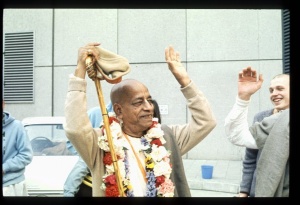SB 4.22.6: Difference between revisions
m (1 revision(s)) |
No edit summary |
||
| Line 1: | Line 1: | ||
{{info | {{info | ||
|speaker=Maitreya | |speaker=Maitreya Ṛṣi | ||
|listener=Vidura | |listener=Vidura | ||
}} | }} | ||
[[Category:Srimad-Bhagavatam - Canto 04 Chapter 22|s06 ]] | |||
[[Category:Bhagavatam Verses Spoken by Maitreya Rsi - Vanisource|042206]] | |||
<div style="float:left">'''[[Srimad-Bhagavatam]] - [[SB 4|Fourth Canto]] - [[SB 4.22: Prthu Maharaja's Meeting with the Four Kumaras|Chapter 22: Pṛthu Mahārāja's Meeting with the Four Kumāras]]'''</div> | |||
<div style="float:right">[[File:Go-previous.png|link=SB 4.22.5]] '''[[SB 4.22.5]] - [[SB 4.22.7]]''' [[File:Go-next.png|link=SB 4.22.7]]</div> | |||
{{RandomImage}} | |||
==== TEXT 6 ==== | ==== TEXT 6 ==== | ||
<div | <div class="verse"> | ||
hāṭakāsana āsīnān | :hāṭakāsana āsīnān | ||
sva-dhiṣṇyeṣv iva pāvakān | :sva-dhiṣṇyeṣv iva pāvakān | ||
śraddhā-saṁyama-saṁyuktaḥ | :śraddhā-saṁyama-saṁyuktaḥ | ||
prītaḥ prāha bhavāgrajān | :prītaḥ prāha bhavāgrajān | ||
</div> | </div> | ||
| Line 16: | Line 22: | ||
==== SYNONYMS ==== | ==== SYNONYMS ==== | ||
<div | <div class="synonyms"> | ||
hāṭaka- | ''hāṭaka-āsane''—on the throne made of gold; ''āsīnān''—when they were seated; ''sva-dhiṣṇyeṣu''—on the altar; ''iva''—like; ''pāvakān''—fire; ''śraddhā''—respect; ''saṁyama''—restraint; ''saṁyuktaḥ''—being decorated with; ''prītaḥ''—pleased; ''prāha''—said; ''bhava''—Lord Śiva; ''agra-jān''—the elder brothers. | ||
</div> | </div> | ||
| Line 23: | Line 29: | ||
==== TRANSLATION ==== | ==== TRANSLATION ==== | ||
<div | <div class="translation"> | ||
The four great sages were elder to Lord Śiva, and when they were seated on the golden throne, they appeared just like fire blazing on an altar. Mahārāja Pṛthu, out of his great gentleness and respect for them, began to speak with great restraint as follows. | The four great sages were elder to Lord Śiva, and when they were seated on the golden throne, they appeared just like fire blazing on an altar. Mahārāja Pṛthu, out of his great gentleness and respect for them, began to speak with great restraint as follows. | ||
</div> | </div> | ||
| Line 30: | Line 36: | ||
==== PURPORT ==== | ==== PURPORT ==== | ||
<div | <div class="purport"> | ||
The Kumāras are described herein as the elder brothers of Lord Śiva. When the Kumāras were born out of the body of Lord Brahmā, they were requested to get married and increase the population. In the beginning of the creation there was a great need of population; therefore Lord Brahmā was creating one son after another and ordering them to increase. However, when the Kumāras were requested to do so, they declined. They wanted to remain brahmacārī throughout life and be engaged fully in the devotional service of the Lord. The Kumāras are called naiṣṭhika-brahmacārī, meaning they are never to marry. Because of their refusal to marry, Lord Brahmā became so angry that his eyes became reddish. From between his eyes, Lord Śiva, or Rudra, appeared. The mode of anger is consequently known as rudra. Lord Śiva also has a sampradāya party, known as the Rudra-sampradāya, and they are also known as Vaiṣṇavas. | The Kumāras are described herein as the elder brothers of Lord Śiva. When the Kumāras were born out of the body of Lord Brahmā, they were requested to get married and increase the population. In the beginning of the creation there was a great need of population; therefore Lord Brahmā was creating one son after another and ordering them to increase. However, when the Kumāras were requested to do so, they declined. They wanted to remain ''brahmacārī'' throughout life and be engaged fully in the devotional service of the Lord. The Kumāras are called ''naiṣṭhika-brahmacārī'', meaning they are never to marry. Because of their refusal to marry, Lord Brahmā became so angry that his eyes became reddish. From between his eyes, Lord Śiva, or Rudra, appeared. The mode of anger is consequently known as ''rudra''. Lord Śiva also has a ''sampradāya'' party, known as the Rudra-''sampradāya'', and they are also known as Vaiṣṇavas. | ||
</div> | </div> | ||
__NOTOC__ | |||
<div style="float:right; clear:both;">[[File:Go-previous.png|link=SB 4.22.5]] '''[[SB 4.22.5]] - [[SB 4.22.7]]''' [[File:Go-next.png|link=SB 4.22.7]]</div> | |||
__NOTOC__ | |||
__NOEDITSECTION__ | |||
Revision as of 09:32, 24 May 2021

A.C. Bhaktivedanta Swami Prabhupada
TEXT 6
- hāṭakāsana āsīnān
- sva-dhiṣṇyeṣv iva pāvakān
- śraddhā-saṁyama-saṁyuktaḥ
- prītaḥ prāha bhavāgrajān
SYNONYMS
hāṭaka-āsane—on the throne made of gold; āsīnān—when they were seated; sva-dhiṣṇyeṣu—on the altar; iva—like; pāvakān—fire; śraddhā—respect; saṁyama—restraint; saṁyuktaḥ—being decorated with; prītaḥ—pleased; prāha—said; bhava—Lord Śiva; agra-jān—the elder brothers.
TRANSLATION
The four great sages were elder to Lord Śiva, and when they were seated on the golden throne, they appeared just like fire blazing on an altar. Mahārāja Pṛthu, out of his great gentleness and respect for them, began to speak with great restraint as follows.
PURPORT
The Kumāras are described herein as the elder brothers of Lord Śiva. When the Kumāras were born out of the body of Lord Brahmā, they were requested to get married and increase the population. In the beginning of the creation there was a great need of population; therefore Lord Brahmā was creating one son after another and ordering them to increase. However, when the Kumāras were requested to do so, they declined. They wanted to remain brahmacārī throughout life and be engaged fully in the devotional service of the Lord. The Kumāras are called naiṣṭhika-brahmacārī, meaning they are never to marry. Because of their refusal to marry, Lord Brahmā became so angry that his eyes became reddish. From between his eyes, Lord Śiva, or Rudra, appeared. The mode of anger is consequently known as rudra. Lord Śiva also has a sampradāya party, known as the Rudra-sampradāya, and they are also known as Vaiṣṇavas.